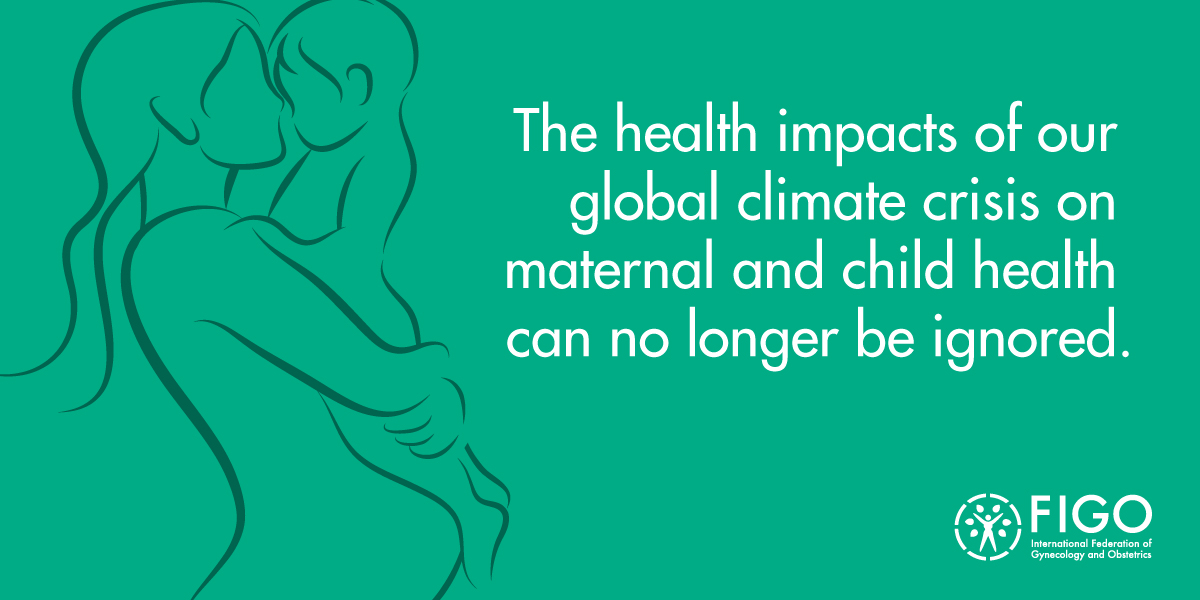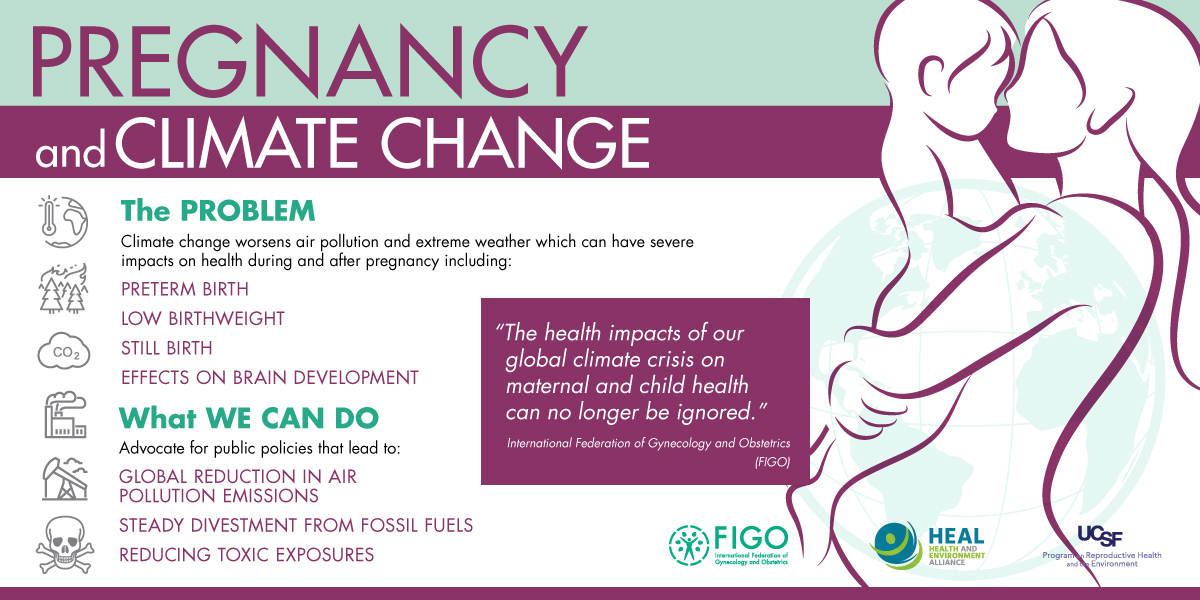FIGO calls on OBGYNs to help “mitigate the climate crisis affecting our patients and their families”
Leading up to the United Nations 2021 Climate Change Conference in Glasgow, Scotland, the International Federation of Gynecology and Obstetrics – which represents hundreds of thousands of maternal and child health care practitioners in more than 130 countries around the world – released a call-to-action on 25 October 2021, for obstetricians and gynaecologists (OBGYNs) to take a leadership role in the climate crisis saying, “The time to act is now.”
In a special article published online in the International Journal of Gynecology & Obstetrics, leading OBGYNs highlight the impact the climate crisis has on human reproduction and the fundamental risks it poses to the very continuation of our species. The authors, who wrote the article on behalf of the FIGO Committee on Climate Change and Toxic Environmental Exposures, highlight the role fossil fuels play in driving climate change and the need for government-driven and society-wide solutions to the crisis.
Clear and present danger to humanity
“The climate crisis has become a public health emergency that disproportionately affects pregnant people, children, those from disadvantaged and marginalised communities, people of colour, and human reproduction. As OBGYNs, we recognise that the climate crisis fundamentally risks the very continuation of our species,” the article states.
The authors review the latest science on how climate change-driven extreme weather displaces communities and families and leads to food and water insecurity, poor air quality, violence (including domestic violence, sexual abuse and trafficking) and disease – all of which put people’s health and sexual and reproductive health and rights at even greater risk. Climate change can also worsen maternity care and pregnancy outcomes in already low-resourced countries.
Impact of climate crisis on pregnancy outcomes and fetal development
Heat and air pollution exposures during pregnancy are linked to “increased risks of stillbirth, low birth weight, and preterm birth… and a significant increase in risk for fetal congenital anomalies,” the article states. “Some portions of the United States are anticipated to have up to a 60% increase in incidence of fetal congenital heart defects by 2035 due to heat exposure. Prenatal heat exposure has been linked to decreased cognitive ability and diminished adult earnings.” The authors also detail the increased risks natural disasters such as flooding and hurricanes pose to women, children and pregnant people, including higher exposure to harmful pollutants and chemicals linked to maternal hypertensive disease, depression, pre-eclampsia, post-traumatic stress and premature birth.
Climate change exacerbates exposures to toxic chemicals
The authors explain how extreme weather can release harmful chemicals and exacerbate the health impacts of air pollution, especially for low-income communities of colour. In addition, it highlights how fossil fuels not only drive climate change, but petroleum and natural gas are ingredients for plastics and other consumer products that contain phthalates, flame retardant chemicals, and PFAS (per- and polyfluoroalkyl substances) – all endocrine-disrupting chemicals that can increase the risk of adverse health effects.
“Production of these chemicals have steadily increased since the 1950s and corresponds to a dramatic increase in health problems affecting women and their families such as diabetes, fertility problems, cancer, and neurodevelopmental disorders,” the article states.
Disproportionate impacts increase inequalities
The groups who experience the greatest environmental injustices are typically least responsible for climate change emissions and are disproportionately women, people of colour and marginalised communities.
“Women are especially hard-hit, with decreased life expectancy from natural disasters, increased incidence of depression, anxiety and post-traumatic stress, and diminished access to health care to treat conditions as diverse as anaemia, malnutrition, menstrual difficulties, and urinary tract infections,” the article states. The authors also explain how climate change contributes to higher rates of sexual exploitation and greater challenges to accessing contraception and reproductive rights, which amplify underlying disparities that exist.
OBGYNS are needed to advocate society-wide solutions
Individual efforts to combat climate change, while “commendable,” are “insufficient” when the fossil fuel industry is a major driver, the authors say. “As health care providers, we need to understand the science underlying the effects of climate change on women’s health and advocate for governments to implement policies that address and reduce the root causes of climate change.”
Article
“Climate change, women’s health, and the role of obstetricians and gynecologists in leadership” (Giudice L, Llamas-Clark EF, DeNicola N, et al. Int J Gynecol Obstet 2021;155. Doi: 10.1002/ijgo.13958.)
Authors
On behalf of the FIGO Committee on Climate Change and Toxic Environmental Exposures: Linda C. Giudice, MD, PhD, chair, FIGO Committee on Climate Change and Toxic Environmental Exposures and University of California, San Francisco (UCSF); Erlidia F. Llamas-Clark, MD, MPH, PhD, University of the Philippines – Philippine General Hospital; Nathaniel DeNicola, MD, MSHP, Johns Hopkins Health System; Santosh Pandipati, MD, Obstetrix Medical Group/Mednax; Marya G Zlatnik, MD MMS, Program on Reproductive Health and the Environment, UCSF; Ditas Cristina D Decena, MD, MPH, University of Santo Tomas; Tracey J. Woodruff, PhD, MPH, Program on Reproductive Health and the Environment and Environmental Research and Translation for Health (EaRTH) Center, UCSF; Jeanne A. Conry, MD, PhD, FIGO President and President and CEO, Environmental Health Leadership Foundation
Images

